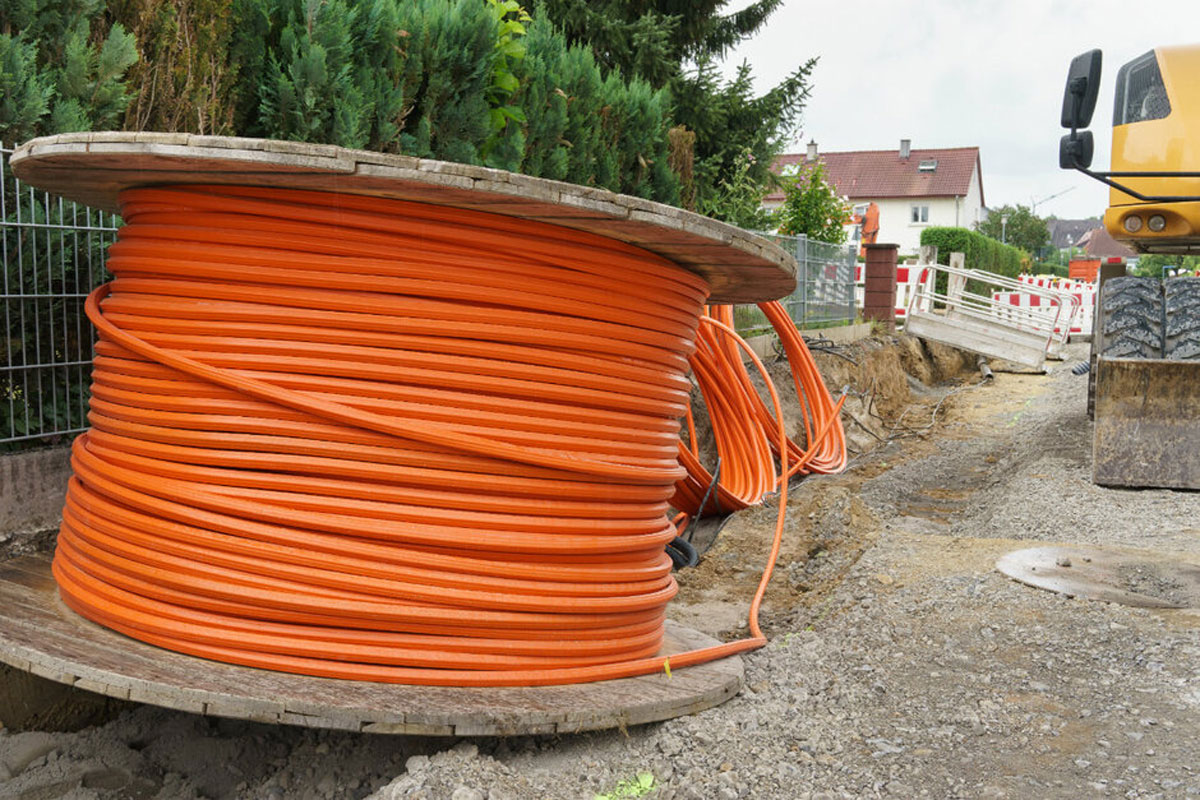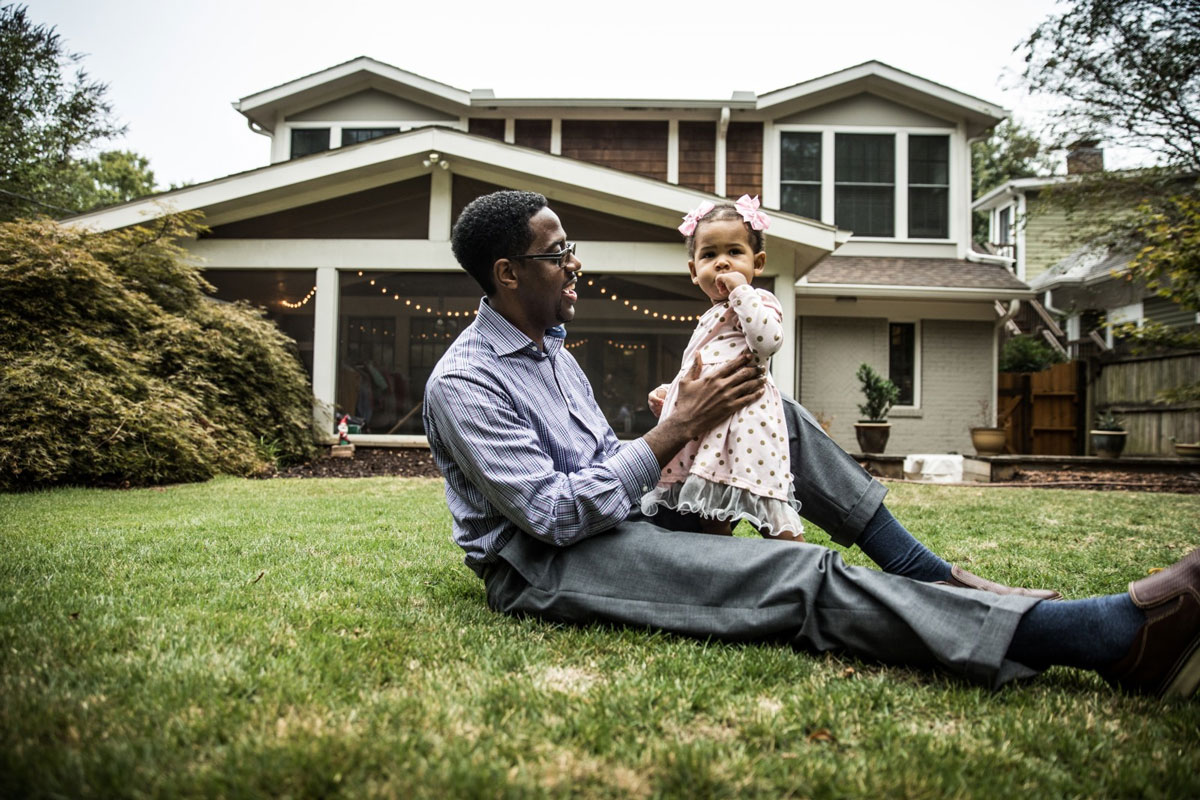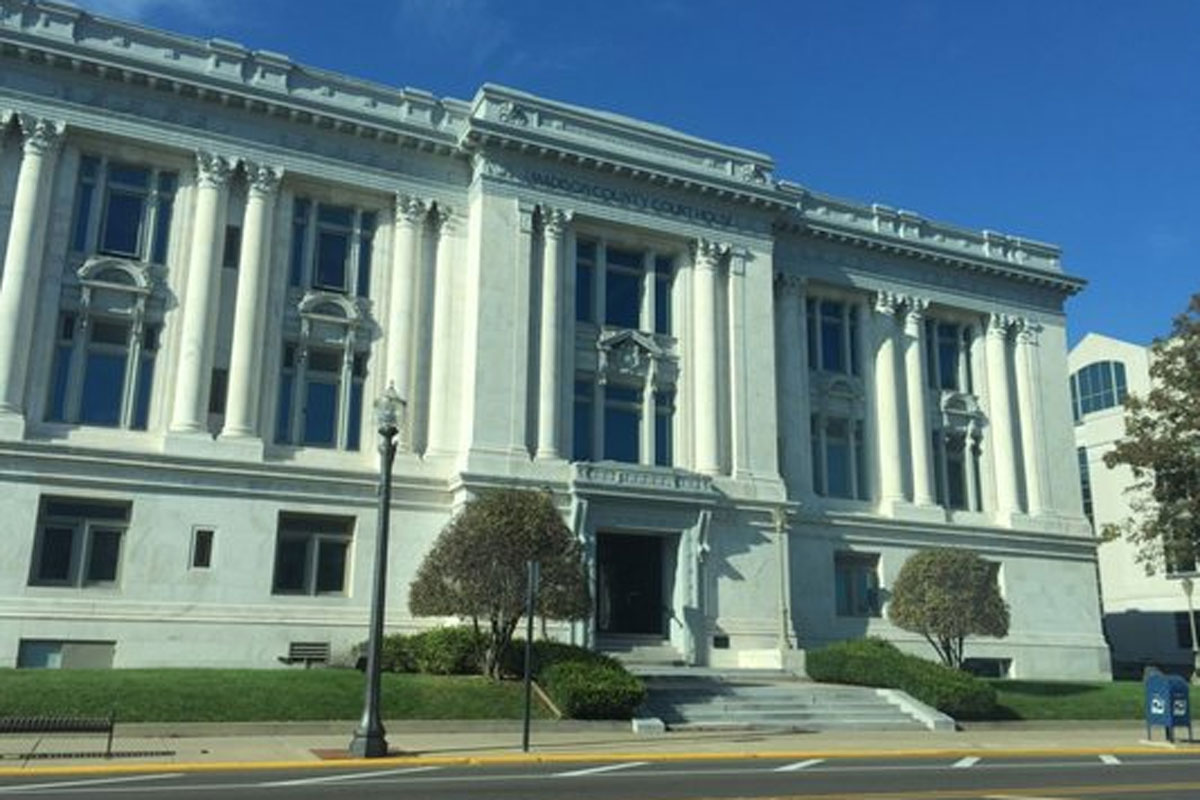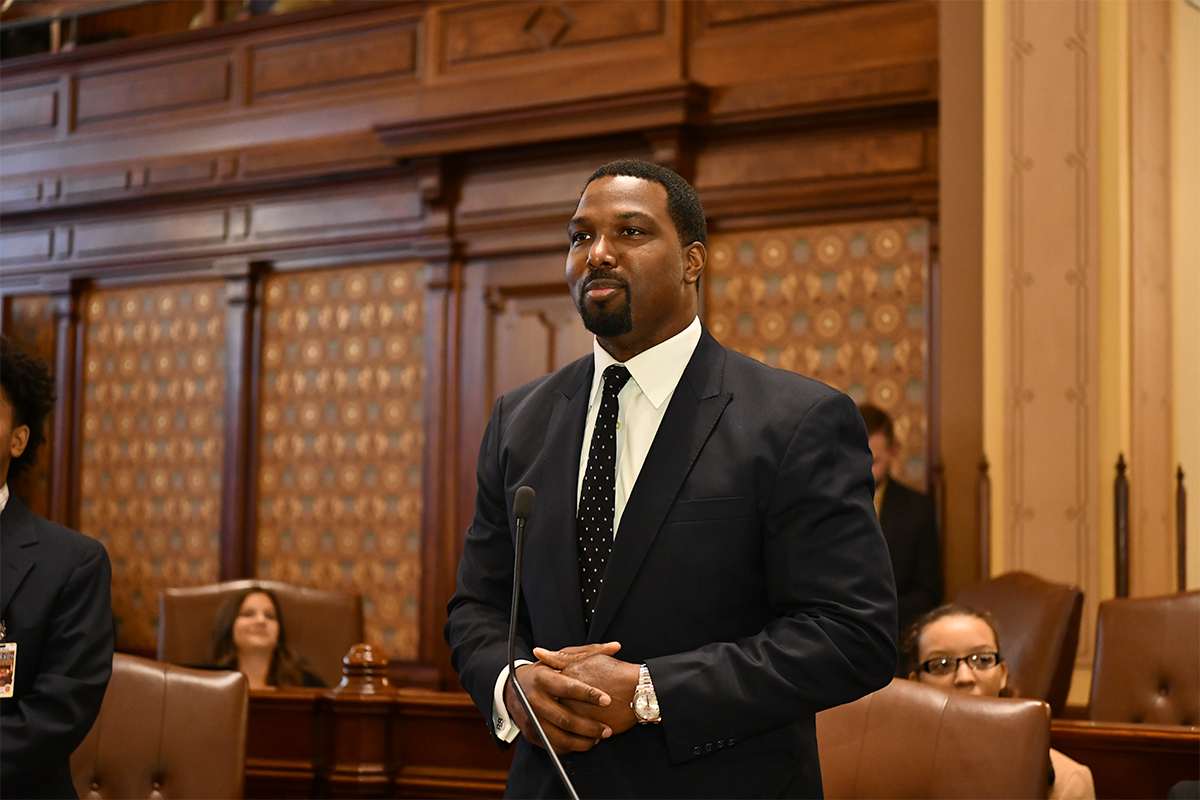- Details
- Category: Senator Rachelle Crowe News
 MARYVILLE – To mend digital inequities in rural areas of the Metro East region, State Senator Christopher Belt (D-Centreville) and State Senator Rachelle Crowe (D-Glen Carbon) are urging local organizations to apply for a portion of $50 million in available funding through the second round of the Connect Illinois broadband expansion program.
MARYVILLE – To mend digital inequities in rural areas of the Metro East region, State Senator Christopher Belt (D-Centreville) and State Senator Rachelle Crowe (D-Glen Carbon) are urging local organizations to apply for a portion of $50 million in available funding through the second round of the Connect Illinois broadband expansion program.
“High-speed internet is one of the most important resources for households and businesses, especially in our current climate,” Belt said. “To ensure that no child, family or business is left behind, I encourage eligible applicants in the Metro East area to apply for the Connect Illinois program.”
The second round of Connect Illinois grants will award up to $5 million per project. At least 50 percent of total project expenses must be provided as nonstate match, be it from private, local or other nonstate sources, to accelerate the delivery of broadband investments. Internet service providers, rural cooperatives, nonprofits and local governments are eligible to apply.
“To ensure small businesses are able to compete and residents are able to connect at work and school, access to reliable, high-speed internet is critical,” Crowe said. “Communities must have the resources to support local digital demands, and applying for this grant is a simple way to expand broadband opportunities to those living in rural and underserved areas.”
Funding for the Connect Illinois program is made possible through Rebuild Illinois, the state’s historic, bipartisan $45 billion statewide construction program, which has dedicated $420 million to expanding broadband infrastructure.
The application will remain open through February 2021. The application and more information on this grant program can be found on the Illinois Department of Commerce and Economic Opportunity’s website.
- Details
- Category: Senator Andy Manar News
 BUNKER HILL – State Senator Andy Manar (D-Bunker Hill) announced an open application period for the second round of Connect Illinois broadband grants to improve access to quality broadband service Downstate.
BUNKER HILL – State Senator Andy Manar (D-Bunker Hill) announced an open application period for the second round of Connect Illinois broadband grants to improve access to quality broadband service Downstate.
Manar, who serves as a chief budget negotiator for the Illinois Senate Democratic Caucus and chairs the Senate Appropriations II Committee, played an instrumental role in this program’s inclusion in the state budget.
“We made broadband expansion a part of the Rebuild Illinois plan because we were fully aware of the glaring gap in access to quality broadband services for many Downstaters,” Manar said. “The COVID-19 pandemic shed light on these already existing problems and made them exponentially worse.”
Read more: Manar announces applications open for second round of Connect Illinois grants
- Details
- Category: Senator Emil Jones III News
 CHICAGO – In an effort to provide better resources for homeownership to working families and communities of color, State Senator Emil Jones (D-Chicago) announced his support of the new SmartBuy mortgage and student loan assistance program.
CHICAGO – In an effort to provide better resources for homeownership to working families and communities of color, State Senator Emil Jones (D-Chicago) announced his support of the new SmartBuy mortgage and student loan assistance program.
“Historical disparities in housing opportunities and resources have severely restricted the ability of minority families to become homeowners,” Jones said. “The SmartBuy mortgage and student loan assistance program will help break down barriers for prospective homebuyers who suffer from student loan debt.”
The Illinois Housing Development Authority (IHDA) launched the SmartBuy program Dec. 1, 2020. The program offers a safe, affordable 30-year fixed rate first mortgage with $5,000 in assistance to be used toward a down payment and/or closing costs. In addition, the program will provide 15% of the purchase price, or up to $40,000, in student loan debt relief to borrowers.
To qualify for SmartBuy, potential borrowers must have at least $1,000 in student loan debt and must pay off their full remaining student loan balance at closing. The program also requires a FICO mid-score of at least 640, and applicants must meet certain income and purchase price requirements.
SmartBuy was created using appropriations allocated to IHDA in the historic, bipartisan Rebuild Illinois capital plan, and is expected to assist approximately 500 to 1000 borrowers.
Learn more about SmartBuy and find a list of SmartBuy approved loan vendors at www.ihdamortgage.org/smartbuy.
- Details
- Category: Senator Rachelle Crowe News
 MARYVILLE – To help local governments cover unexpected costs due to COVID-19, State Senator Rachelle Crowe (D-Glen Carbon) and State Representative Katie Stuart (D-Edwardsville) have secured critical federal funding for Madison County, East Alton, the Caseyville Public Library District and many others through the Local Coronavirus Urgent Remediation Emergency (Local CURE) program.
MARYVILLE – To help local governments cover unexpected costs due to COVID-19, State Senator Rachelle Crowe (D-Glen Carbon) and State Representative Katie Stuart (D-Edwardsville) have secured critical federal funding for Madison County, East Alton, the Caseyville Public Library District and many others through the Local Coronavirus Urgent Remediation Emergency (Local CURE) program.
“The pandemic continues to inflict unexpected financial devastation on many industries,” Crowe said. “By successfully applying and utilizing Local CURE funding, we can ensure COVID-19 expenses don’t fall on the backs of taxpayers.”
Local CURE funds can be used to reimburse a variety of costs associated with COVID-19, including purchasing personal protective equipment, the cost of sanitizing and arranging workspaces and public spaces to follow public safety guidelines, COVID-19-related overtime expenses, and more.
“It is vital that our local governmental entities are able to recoup what they can from this federal funding. Everyone, from our county government to our libraries have been impacted by this virus,” Stuart said. “These funds will help them deal with the costs associated with protecting our public health during this crisis.”
The Local CURE program is federally funded from the Coronavirus Relief Fund using dollars allocated to Illinois through the CARES Act. These dollars are allocated by the Department of Commerce and Economic Opportunity to downstate local governments to help cover necessary expenditures incurred due to the COVID-19 crisis.
- Details
- Category: Senator Ann Gillespie News
 ARLINGTON HEIGHTS – To help young people facing student debt achieve home ownership, State Senator Ann Gillespie (D-Arlington Heights) is encouraging prospective homebuyers to apply for the Illinois Housing Development Authority’s (IHDA) SmartBuy mortgage assistance program.
ARLINGTON HEIGHTS – To help young people facing student debt achieve home ownership, State Senator Ann Gillespie (D-Arlington Heights) is encouraging prospective homebuyers to apply for the Illinois Housing Development Authority’s (IHDA) SmartBuy mortgage assistance program.
“Young people have an opportunity to consolidate their student loan debt with a fixed rate mortgage,” Gillespie said. “At a time when home ownership is increasingly difficult to achieve, especially for those just starting out, this is a platform for success.”
IHDA launched the SmartBuy program Dec. 1, 2020. The program offers a safe, affordable 30-year fixed rate first mortgage with $5,000 in assistance to be used toward a down payment and/or closing costs. The SmartBuy program will also provide 15% (up to $40,000) in student loan debt assistance to borrowers.
Borrowers must have at least $1,000 in student loan debt to qualify and must pay off their remaining student loan balance at closing. Income and purchase price requirements also apply. SmartBuy is funded though the Rebuild Illinois capital plan and is expected to help 500-1,000 borrowers.
Learn more about SmartBuy and find a list of participating lenders at www.ihdamortgage.org/smartbuy.
- Details
- Category: Senator Napoleon Harris III News
 SPRINGFIELD – State Senator Napoleon Harris (D-Harvey), will head a number of hearings later this month to review Illinois’ efforts to increase diversity in pension investment managers.
SPRINGFIELD – State Senator Napoleon Harris (D-Harvey), will head a number of hearings later this month to review Illinois’ efforts to increase diversity in pension investment managers.
Under Illinois law, public employee pension systems must set and work toward diversity goals. They must also increase access to state contracts for investment management firms, brokerages and other vendors owned by minorities, women or people with disabilities. Since 2004, the Senate has held annual hearings to receive updates from the pension systems on their progress in meeting these goals and to discuss ways in which the state can continue to break down barriers for emerging investment managers and other financial professionals.
Read more: Harris to discuss state’s diversity goals for pension managers
- Details
- Category: Senator Steve Stadelman News
 ROCKFORD – State Senator Steve Stadelman (D-Rockford) is encouraging drivers to take advantages of the Rockford-Central driver services facility’s drive-thru license plate sticker renewal.
ROCKFORD – State Senator Steve Stadelman (D-Rockford) is encouraging drivers to take advantages of the Rockford-Central driver services facility’s drive-thru license plate sticker renewal.
“Many people have expressed concerns about waiting inside during the ongoing public health crisis to renew their license plate stickers or standing in long lines in the cold,” Stadelman said. “I’m happy to see that the secretary of state’s office is offering people a safer and easier way to renew their registrations through the drive-thru service.”
The facility will be open Tuesday from 8 a.m. to 5:30 p.m., Wednesday from 8 a.m. to 5 p.m. and Saturday from 7:30 a.m. to 12 p.m. Credit cards and checks will be the only accepted forms of payment, and customers will be required to wear masks.
Illinoisans with access to the internet can also renew their vehicle registration stickers and benefit from other online services provided at www.cyberdriveillinois.com. All expiration dates for driver’s licenses and ID cards have been extended until June 1, 2021.
“If you can, please try to renew your registration online” Stadelman said. “The more people who do, will mean quicker service for people who have to use the drive-thru service.”
Stadelman would also like to remind Rockford residents the federal government has extended the REAL ID deadline by one year. The new deadline is now Oct. 1, 2021.
- Details
- Category: Senator Adriane Johnson News
 BUFFALO GROVE — State Senator Adriane Johnson (D-Buffalo Grove) is encouraging families who want to buy a house but are hindered by student loan debt to take advantage of Illinois’ new SmartBuy mortgage and student loan assistance program.
BUFFALO GROVE — State Senator Adriane Johnson (D-Buffalo Grove) is encouraging families who want to buy a house but are hindered by student loan debt to take advantage of Illinois’ new SmartBuy mortgage and student loan assistance program.
“Young people, particularly young people who live in minority communities, are often held back from purchasing a home due to the weight of student loan debt,” Johnson said. “Families deserve the peace of mind that they can have both a quality education and a forever home.”
The Illinois Housing Development Authority launched the SmartBuy program, which offers a safe, affordable 30-year fixed rate first mortgage with $5,000 in assistance to be used toward a down payment and/or closing costs. In addition, the program allows people to combine their student loan debt into a mortgage in an effort to lower the high interest rate of student loans and get rid of the student loan portion of debt. The program provides 15% of the purchase price, or up to $40,000, in student loan debt relief to borrowers.
A 2018 study by the University of Illinois found that outstanding student loan debt negatively impacts wealth accumulation for all borrowers — regardless of race — but the impact is especially significant for Black and Latinx borrowers.
To qualify for SmartBuy, potential borrowers must have at least $1,000 in student loan debt and must pay off their full remaining student loan balance at closing. The program also requires a FICO mid-score of at least 640, and applicants must meet certain income and purchase price requirements.
SmartBuy was created using funding from the historic, bipartisan Rebuild Illinois statewide construction plan, and is expected to assist approximately 500 to 1000 borrowers.
Learn more about SmartBuy and find a list of SmartBuy approved loan vendors at www.ihdamortgage.org/smartbuy.
More Articles …
Page 585 of 762













 © 2026 Illinois Senate Democratic Caucus
© 2026 Illinois Senate Democratic Caucus